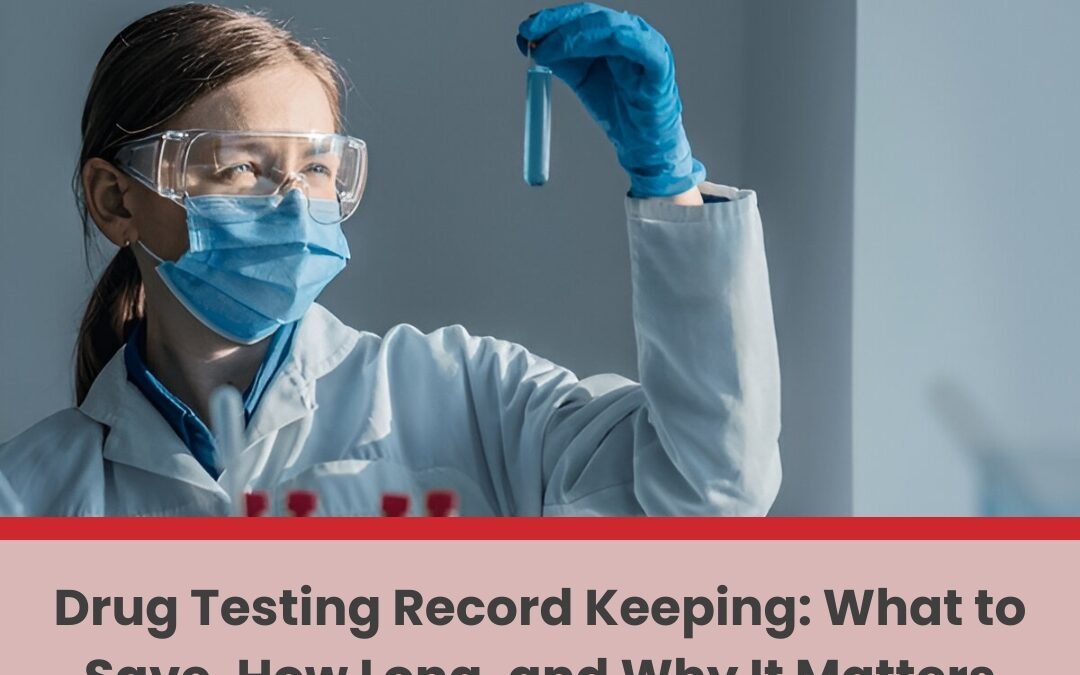Drug testing record keeping helps your company stay safe, follow the law, and avoid problems. If something goes wrong, these records show that you followed the rules. That’s why it is so important to save the right information and to keep it for the right amount of time.
In this post, you will learn exactly what to save, how long to keep it, and why drug testing record keeping matters. We’ll use simple words and short sentences to make it easy to follow. This guide is great for business owners, managers, and HR staff.
What Is Drug Testing Record Keeping?
Drug testing record keeping means saving all documents related to drug testing. These records are often used to prove that your company acted fairly and followed rules. If your business ever faces an audit or legal complaint, your records will protect you.
These records also help your company build trust. When employees know the rules are followed for everyone, they feel safer and treated fairly. Good records support workplace compliance and show that your company is serious about doing things the right way.
Why Is Drug Testing Record Keeping Important?
Let’s look At The Main Reasons:
1. Legal Protection
If someone sues your business, your records can help show that you followed the law.
2. Compliance
Some jobs have strict rules, like trucking or aviation. These rules often come from DOT. They require you to save certain records for many years.
3. Safety
Your records help you track trends. If there are many positive tests in one department, you can take action before problems grow.
4. Fairness
Keeping the same records for every test helps ensure you treat every worker the same. This is a big part of workplace compliance.
Types Of Records You Should Keep
Not all records are the same. Some are more important than others. Let’s look at each type you should keep.
1. Consent Forms
Before testing, employees must agree to take the test. They usually sign a paper that says they understand the test and agree to it. Keep a copy of this form.
2. Test Results
Save both positive and negative results. Even canceled tests or invalid results should be kept. If someone says later that they were treated unfairly, you will have the facts.
3. Chain Of Custody Forms
These forms show who handled the sample during each step. They make sure the test was done right and that the sample was not changed or lost.
4. Testing Location Details
Sometimes you may need to show where and when the test happened. Write down the name of the testing site and the date and time.
5. Employee Policy Acknowledgement
Employees should sign that they understand your drug testing policy. Keep this in their file.
6. Company Drug Testing Policy
Keep the full policy with your records. This includes how and when you test, what happens if someone fails, and your process for second chances.
7. Communication Records
Save emails, texts, or notes about the testing process. If you had a call with an employee about a test, write it down.
8. Supervisor Training Records
If you train managers on how to spot drug use or how to follow testing rules, keep a copy of that training. It shows you are working to keep your workplace safe.
How Long Should You Keep Drug Testing Records?
How long you keep records depends on the type of job and which rules apply. There are two main groups to think about: DOT-regulated and non-DOT workplaces.
1. DOT-Regulated Workplaces
If your company falls under the Department of Transportation (DOT), here is what you must save:
- Positive test results: Keep for 5 years
- Alcohol test results of 0.02 or higher: Keep for 5 years
- Refusals to test: Keep for 5 years
- Return-to-duty and follow-up testing records: Keep for 5 years
- Negative and canceled test results: Keep for 1 year
- Training records for supervisors: Keep for 2 years
- Drug testing policy and procedures: Keep for 2 years
2. Non-DOT Or General Business
For jobs that are not under DOT rules, there is no one law for how long to keep records. However, many experts suggest:
- Keep positive tests, refusals, and policy records for at least 3 years
- Keep negative and canceled results for 1 year
- Keep consent forms and test site info for 2 years
Check your state laws, as some may require longer periods.
Why Workplace Compliance Is Linked To Drug Testing Record Keeping
Workplace compliance means following laws and making sure the workplace is fair and safe.
Drug testing record keeping is part of this because it shows your company follows the same process for all workers.
Let’s say a worker files a complaint and says they were tested unfairly. If you have good records, you can show:
- They signed a consent form
- The policy was followed
- The test results were handled correctly
- The same process was used for other workers
This helps show that you followed the law and acted fairly.
Example Story
A shipping company tested one of its drivers after a crash. The worker tested positive. Months later, the driver claimed he was never told about the company’s drug testing policy. He filed a legal complaint.
But the company had records: the driver’s signed policy acknowledgment, his consent form, and emails showing he knew about the policy. The company also had proof the same steps were used for all drivers. Because of the records, the company won the case.
This is a real reason why drug testing record keeping is so important.
Mistakes To Avoid
Some companies try to keep records but make mistakes. Here are a few common ones to watch out for:
1. Throwing Away Records Too Early
Even if the test was negative, you may need to keep the record for at least a year. Don’t toss anything too soon.
2. Not Saving Everything In One Place
If your records are in many places, it’s hard to find what you need. Use one system or folder for all drug testing records.
3. Not Following Your Own Policy
If your policy says keep records for three years, but you only save them for one, you may have problems later. Always follow your written policy.
4. No Backups
If you use a computer to store records, make sure there’s a backup. A broken hard drive or lost file can cause big trouble.
Simple Tips For Better Drug Testing Record Keeping
1. Use A Checklist
Make a list of what to save for every test: consent form, results, policy, and more.
2. Label Files Clearly
Write names, dates, and test type on every folder or file.
3. Set A Calendar Reminder
Every month, check your records to make sure they’re up to date.
4. Keep Records Private
Only the right people should see drug test records. They must stay private and secure.
5. Train Your Team
Make sure your managers know how to collect and save records the right way. Everyone should follow the same steps.
How Tailored Testing Service Makes It Easy
At Tailored Testing Services, we help businesses of all sizes with drug testing and record keeping. We make sure your tests are done the right way. We also help you store and organize your records so they are always ready if you need them.
You don’t need to guess what to save or how long to keep it. Our team handles that for you. If you have 10 employees or 1,000, we can help your company stay on track with workplace compliance.
Conclusion
Drug testing record keeping may seem simple, but it is very important. It helps protect your company, keeps your workplace safe, and supports fair treatment. The records you save today can help you tomorrow especially if there’s a legal issue or audit.
Save the right documents. Keep them for the correct amount of time. Store them in one safe place. Review them often. And always follow your own policy.
If you’re unsure how to do it right, Tailored Testing Services can help. We take care of your testing and record keeping so you don’t have to worry.
Let us help you stay safe, stay compliant, and stay prepared. Visit yourtailoredservice.com to learn more today.
Bold Moves Start with Smart Records. Keep It Clear with Tailored Testing Services!
At Tailored Testing Services, we make drug testing record keeping easy, organized, and stress-free. Stay in control. Stay compliant. Stay confident. Let us help you meet every rule with care and keep your workplace safe.
FAQ
Q: Do I have to keep a record if the drug test was negative?
A: Yes, all drug test results should be saved, even if the result is negative. Negative results help show your company treats all employees fairly. DOT rules say to keep negative results for at least one year.
Q: Can I keep the records on my computer?
A: Yes, storing them on a computer is okay if they are safe. Use passwords to protect files from others. Always keep a backup just in case your files are lost.
Q: What if an employee refuses to take a test?
A: You should write down the refusal and keep a copy of any forms or emails. This proves your company followed the right steps. DOT rules say to keep refusal records for five years.
Q: Do I need to keep records for job applicants who tested positive?
A: Yes, it’s a good idea to save those records. This shows that your company followed fair hiring steps. Keep them for at least one year, or longer if state laws say so.
Q: What if my company doesn’t follow DOT rules?
A: Even non-DOT companies should keep drug test records. Many state laws require this, and it helps protect your business. It also shows that your company is serious about safety and fairness.




